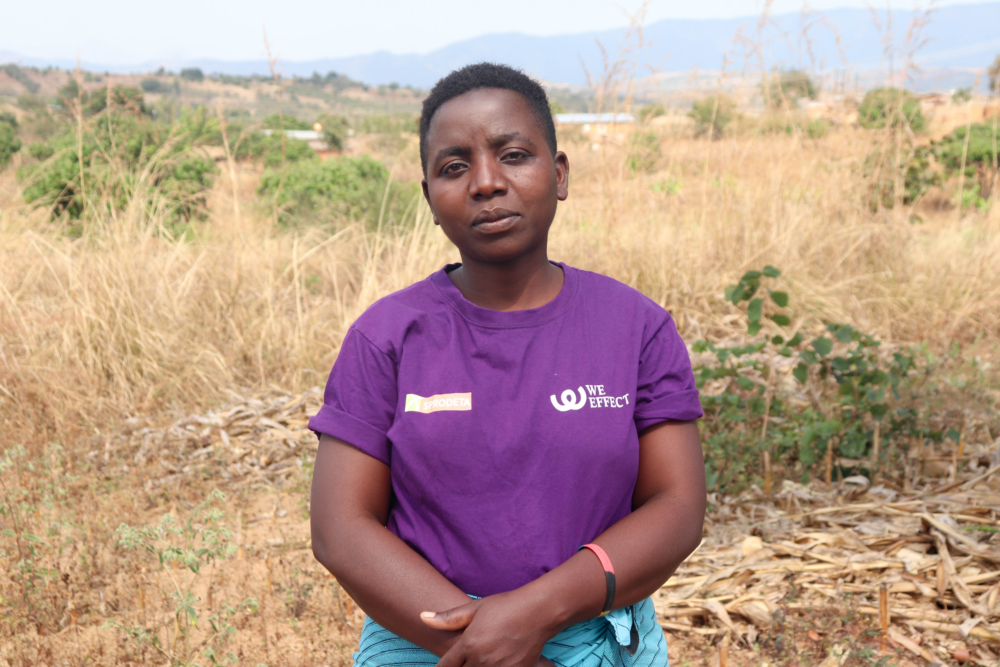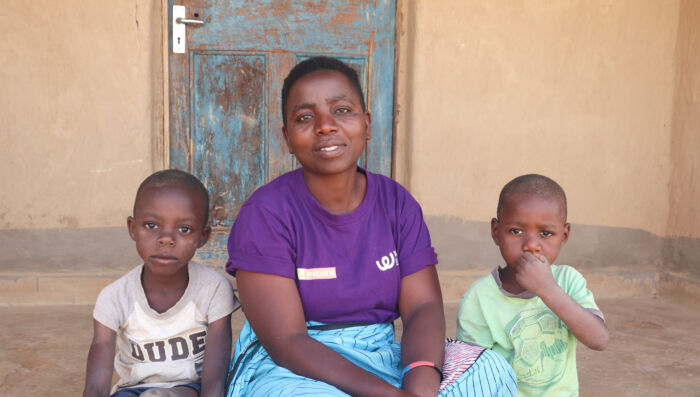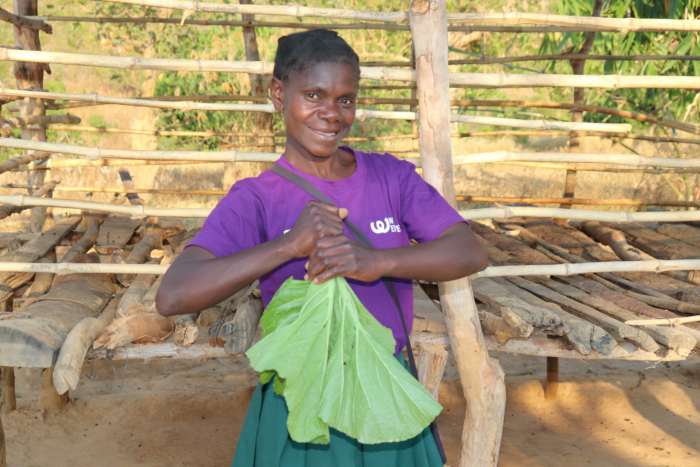Raising awareness empowers women’s land rights and transforms lives
Date
September 19, 2024
Emmie Gondwe. Photo: Austin Moyo, SPRODETA
In Rumphi district just like in many other patriarchal systems in the northern region of Malawi, women access to land has for long been denied due to cultural inheritance customs hindering their economic independence. Parents would share land to only male children once they have married with the assumption that the girl child will get married and will inherit her husband’s land, the practice which is currently being advocated against. Women who are divorced or widowed would only live at the mercy of the brothers or brothers in law. Therefore, most women headed households are unable to make enough money to take care of their families.
Responding to the situation, Small Producers Development and Transporters Association (SPRODETA), a local NGO in Malawi with support from We Effect in a Sida CIVSAM funded programme, targeted traditional leaders who are the custodians of culture and advocated for women rights on land and property. SPRODETA engaged in advocacy work which resulted in establishment and strengthening of local Women Action Groups (WAG) to lobby and advocate for protection and promotion of women’s political and economic rights; sensitizing women and the general community on among other things women’s property and land rights and lobbying chiefs for inclusion of women in village tribunals.
The WAGs then conducted 12 impactful advocacy sessions in the two districts where 100 chiefs were lobbied to include women in their tribunals. Successful advocacy efforts resulted in the inclusion of 84 women in village tribunals. Including women in tribunals has contributed to ensure that issues affecting women are being raised and discussed and solutions to support them are developed. By actively participating in village tribunals, these 84 women are not only ensuring their voices are heard but also contributing to the overall goal of inclusive decision-making processes. The traditional leaders have also been paramount in supporting and advocating for women land rights as they have been able to carry the messages to their subordinates using the various community meeting platforms.
As part of this process 3,320 community members (1,852 women and 1,468 men) were also sensitized on women’s property and land rights. The awareness campaigns were conducted together with various key land rights and property stakeholders which included the judiciary, ministry of gender and social welfare, police, traditional leaders and religious leaders. Awareness campaigns were organised at village level where drama, and music about women land rights were performed followed by discussions. Radio broadcasts were also used to disseminate the information to the masses of people.
The interventions yielded satisfactory results witnessing granting of land to 101 women. The granting of land to the 101 women is a concrete illustration of how awareness and advocacy can lead to tangible improvements in transforming the lives of women. This result is significant as it lies in addressing a fundamental aspect of gender inequality – access to and ownership of property.
Testimonies from the rights-holders who were granted land, as well as from community leaders, provided qualitative evidence of the positive impact on individual lives and the broader community. For example, Etinala Lwesha, one of the rights-holders in Chitipa district who was granted land, now has her own 0.8 hectare of land for farming. This means a lot to her as she now has the freedom to cultivate and produce as she wishes. Previously, she used to cultivate her father’s land, and it was the father who dictated the types of crops to be grown as the head of the family and the owner of the land.
For Emmie Gondwe, a 35-year-old woman from Chikakula village in traditional authority Mwalweni, now owns 4 hectares of land from which she is able to produce enough to support her family. After her divorce in 2018, Emmie was given 0.5 acres of land by her brothers from which she could not produce enough to feed her 2 children and generate enough money to sustain her home.

Following the massive awareness campaigns, her brothers saw the importance of having women own land and they gave her 4 hectares of land. In 2023/2024 farming season, Emmie harvested 1,125 kg of maize and 700 kg of ground nuts. She was then able to sell 400 kg of the ground nuts to provide income and she is currently constructing a mini shop as part of income diversification. In addition, Emmie has managed to process official documents for her land which will be valid evidence for the land that was given to her.
Similarly, Grace Mkandawire from the same region can now support her four children through farming. Through the advocacy work of the local WAGs with support from the community leaders, Grace was granted 3 acres land by her father and brothers. From her 3 acres of land, she is able to grow enough food for her family and generate income. In 2023/2024 farming season, Grace managed to harvest 1,615 kg of maize and 810 kg of ground nuts. She has since sold 600 kg of maize and 500 kg of groundnuts and earned a sum of K850,000. This has made it possible for her to do electrical wiring for her house and pay the electricity connection fees. She believes having electricity will help her children study effectively at night. Apart from crop cultivation, she has also diversified into poultry, piggery and goat keeping.

– When I had not been given land, I used to rent one to access it but with the economic hardship it was very hard to balance the cost. Rents are paid in advance and I could manage to pay rent and eventually fail to purchase farm inputs. But now, all my worries have been reduced, explained Grace.